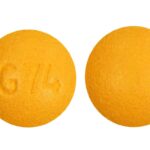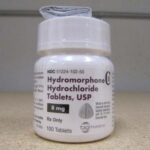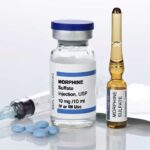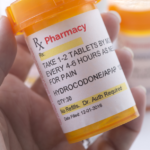Oxymorphone: Uses, Side Effects, Abuse, Addiction
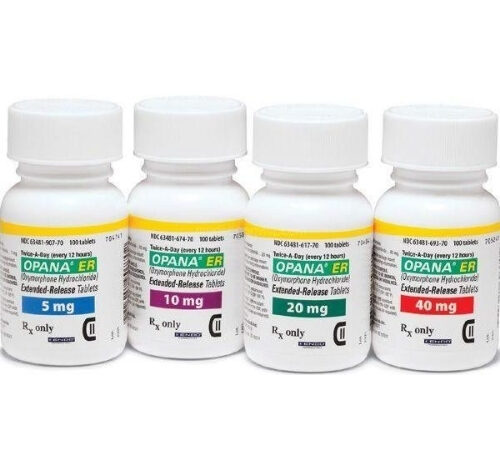
Oxymorphone, sold under the brand names Numorphan and Opana among others belongs to a class of medications called opiate (narcotic) analgesics. It works by changing the way the body responds to pain. Oxymorphone is used to relieve moderate to severe pain in people whose pain is not controlled with other medications. Pain relief after injection begins after about 5–10 minutes, after oral administration it begins after about 30 minutes, and lasts about 3–4 hours for immediate-release tablets and 12 hours for extended-release tablets
It was developed in Germany in 1914. It was patented in 1955 and approved for medical use in 1959. In June 2017 the FDA asked Endo Pharmaceuticals to remove its product from the US market. This was in part due to the opioid epidemic in the US, and the fact that a 2012 reformulation failed to stop illicit injection of the drug. Endo responded by voluntarily removing Opana ER from the market a month later. Generic versions of extended-release oxymorphone, such as those manufactured by Amneal Pharmaceuticals, are still available in the US.
Oxymorphone is a DEA Schedule II controlled substance. Substances in the DEA Schedule II have a high potential for abuse which may lead to severe psychological or physical dependence.
How should oxymorphone be used?
Oxymorphone comes as a tablet and as an extended-release (long-acting) tablet to take by mouth on an empty stomach, at least 1 hour before or 2 hours after meals. It is usually taken every 4 to 6 hours. Follow the directions on your prescription label carefully, and ask your doctor or pharmacist to explain any part you do not understand. Take oxymorphone exactly as directed. Do not take more or less of it or take it more often than prescribed by your doctor.
Swallow the extended-release tablets whole; do not chew or crush them.
Your doctor will probably start you on a low dose of oxymorphone and gradually increase your dose until your pain is controlled. Your doctor may adjust your dose at any time during your treatment if your pain is not controlled. If you feel that your pain is not controlled, call your doctor. Do not change the dose of your medication without talking to your doctor.
Do not stop taking oxymorphone without talking to your doctor. Your doctor will probably decrease your dose gradually. If you suddenly stop taking oxymorphone, you may experience withdrawal symptoms such as restlessness; watery eyes; runny nose; yawning; sweating; chills; muscle, joint, or back pain; enlarged pupils (black circles in the centers of the eyes); irritability; anxiety; weakness; stomach cramps; difficulty falling asleep or staying asleep; nausea; vomiting; diarrhea; loss of appetite; fast heartbeat; and fast breathing.
What side effects can this medication cause?
Oxymorphone may cause side effects. Tell your doctor if any of these symptoms are severe or do not go away:
- dry mouth
- stomach pain or swelling
- nausea
- vomiting
- gas
- excessive sweating
- flushing
- fast heartbeat
- red eyes
- headache
- feeling anxious or confused
- itching
Some side effects can be serious. If you experience any of the following symptoms call your doctor immediately:
- agitation, hallucinations (seeing things or hearing voices that do not exist), fever, sweating, confusion, fast heartbeat, shivering, severe muscle stiffness or twitching, loss of coordination, nausea, vomiting, or diarrhea
- nausea, vomiting, loss of appetite, weakness, or dizziness
- inability to get or keep an erection
- irregular menstruation
- decreased sexual desire
- changes in heartbeat
- seizures
- rash, hives, itching, nausea, vomiting, hoarseness, difficulty breathing or swallowing, chest pain. or swelling of the hands, eyes, face, lips, mouth, tongue or throat
- extreme drowsiness
- fainting
Oxymorphone may cause other side effects. Call your doctor if you have any unusual problems while taking this medication.
Oxymorphone Safety Information
Oxymorphone may be habit forming, especially with prolonged use. Take oxymorphone exactly as directed. Do not take a larger dose, take it more often, or take it for a longer period of time, or in a different way than prescribed by your doctor. While taking oxymorphone, discuss with your health care provider your pain treatment goals, length of treatment, and other ways to manage your pain. Tell your doctor if you or anyone in your family drinks or has ever drunk large amounts of alcohol, uses or has ever used street drugs, or has overused prescription medications, or has had an overdose, or if you have or have ever had depression or another mental illness. There is a greater risk that you will overuse oxymorphone if you have or have ever had any of these conditions. Talk to your healthcare provider immediately and ask for guidance if you think that you have an opioid addiction or call the U.S. Substance Abuse and Mental Health Services Administration (SAMHSA) National Helpline at 1-800-662-HELP.
Oxymorphone may cause serious or life-threatening breathing problems, especially during the first 72 hours of your treatment and any time your dose is increased. Your doctor will monitor you carefully during your treatment. Tell your doctor if you have or have ever had slowed breathing, or asthma. Your doctor will probably tell you not to take oxymorphone tablets. Also tell your doctor if you have or have ever had lung disease such as chronic obstructive pulmonary disease (COPD; a group of lung diseases that includes chronic bronchitis and emphysema), a head injury, brain tumor, any condition that increases the amount of pressure in your brain, or sleep apnea (condition in which breathing stops or becomes shallow during sleep). The risk that you will develop breathing problems may be higher if you are an older adult or are weak or malnourished due to disease. If you experience any of the following symptoms, call your doctor immediately or get emergency medical treatment: slowed breathing, long pauses between breaths, or shortness of breath.
Taking certain medications other medications with oxymorphone may increase the risk that you will develop serious or life-threatening breathing problems, sedation, or coma. Tell your doctor and pharmacist if you are taking or plan to take any of the following medications: benzodiazepines such as alprazolam (Xanax), chlordiazepoxide (Librium), clonazepam (Klonopin), diazepam (Diastat, Valium), estazolam, flurazepam, lorazepam (Ativan), oxazepam, temazepam (Restoril), and triazolam (Halcion);medications for mental illness or nausea; other narcotic pain medications; muscle relaxants; sedatives; sleeping pills; and tranquilizers. Also tell your doctor or pharmacist if you are taking any of the following medications or have stopped taking them within the past 2 weeks: monoamine oxidase (MAO) inhibitors such as isocarboxazid (Marplan), linezolid (Zyvox), phenelzine (Nardil), rasagiline (Azilect), selegiline (Emsam, Eldepryl, Zelapar), and tranylcypromine (Parnate).Your doctor may need to change the doses of your medication and will monitor you carefully. If you take oxymorphone with any of these medications and you develop any of the following symptoms, call your doctor immediately or seek emergency medical care: unusual dizziness, lightheadedness, extreme sleepiness, slowed or difficult breathing, or unresponsiveness. Be sure that your caregiver or family members know which symptoms may be serious so they can call the doctor or emergency medical care if you are unable to seek treatment on your own.
Drinking alcohol, taking prescription or nonprescription medications that contain alcohol, or using street drugs during your treatment with oxycodone increases the risk that you will experience serious, life-threatening side effects. Do not drink alcohol, take prescription or nonprescription medications that contain alcohol, or use street drugs during your treatment.
Do not allow anyone else to take your medication. Oxymorphone may harm or cause death to other people who take your medication, especially children. Store oxymorphone in a safe place so that no one else can take it accidentally or on purpose. Be especially careful to keep oxymorphone out of the reach of children. Keep track of how many tablets, or capsules are left so you will know if any medication is missing.
Tell your doctor if you are pregnant or plan to become pregnant. If you take oxymorphone regularly during your pregnancy, your baby may experience life-threatening withdrawal symptoms after birth. Tell your baby’s doctor right away if your baby experiences any of the following symptoms: irritability, hyperactivity, abnormal sleep, high-pitched cry, uncontrollable shaking of a part of the body, vomiting, diarrhea, or failure to gain weight.
Talk to your doctor about the risks of taking oxymorphone. Your doctor or pharmacist will give you the manufacturer’s patient information sheet (Medication Guide) when you begin treatment with oxymorphone and each time you fill your prescription. Read the information carefully and ask your doctor or pharmacist if you have any questions. You can also visit the Food and Drug Administration (FDA) website.
How to overcome oxymorphone abuse
Overcoming oxymorphone abuse can be a challenging process, but with the right approach and support, recovery is possible. Here are some steps you can take to address oxymorphone abuse:
1. Acknowledge the problem: Admitting that you have a problem with oxymorphone abuse is an important first step. Recognize the negative impact it has had on your life and the need for change.
2. Seek professional help: Consult a healthcare professional who specializes in addiction medicine. They can provide an assessment, offer guidance, and develop an individualized treatment plan based on your specific needs.
3. Detoxification: If you have developed physical dependence on oxymorphone, a medically supervised detoxification may be necessary. This process helps your body eliminate the drug while managing withdrawal symptoms. It’s important to undergo detoxification under medical supervision to ensure safety and comfort.
4. Consider medication-assisted treatment: Medications such as buprenorphine or methadone may be prescribed as part of a medication-assisted treatment (MAT) program. These medications can help manage cravings and withdrawal symptoms, allowing you to focus on your recovery. MAT is typically combined with counseling and behavioral therapies.
5. Engage in therapy and counseling: Individual therapy and counseling can address the underlying causes of your oxymorphone abuse and provide you with coping mechanisms and relapse prevention strategies. Cognitive-behavioral therapy (CBT) and other evidence-based therapies are commonly used to treat opioid addiction.
6. Join support groups: Participating in support groups such as Narcotics Anonymous (NA) or other addiction support groups can provide you with a sense of community, understanding, and support from others who have faced similar challenges. Sharing experiences and learning from others can be invaluable during your recovery journey.
7. Build a support network: Surround yourself with supportive and understanding individuals who can encourage your recovery. This may involve reaching out to family members, close friends, or a sponsor from a support group who can provide emotional support and accountability.
8. Make lifestyle changes: Identify and address triggers and situations that have contributed to your oxymorphone abuse. This may involve making changes to your social circle, avoiding places or people associated with drug use, and adopting healthy habits such as regular exercise, balanced nutrition, and stress management techniques.
9. Practice self-care: Take care of your physical, emotional, and mental well-being. Engage in activities that promote relaxation, self-reflection, and personal growth. This may include exercise, mindfulness, meditation, hobbies, or creative outlets.
10. Stay committed and seek ongoing support: Recovery from oxymorphone abuse is a long-term process. Stay committed to your treatment plan, attend therapy sessions, and continue to engage in support groups even after initial recovery. Ongoing support can help you maintain sobriety and address any challenges that arise along the way.
Remember, everyone’s journey to recovery is unique, and it’s essential to tailor your approach to your specific needs. Seek professional guidance and surround yourself with a supportive network to increase your chances of success.

